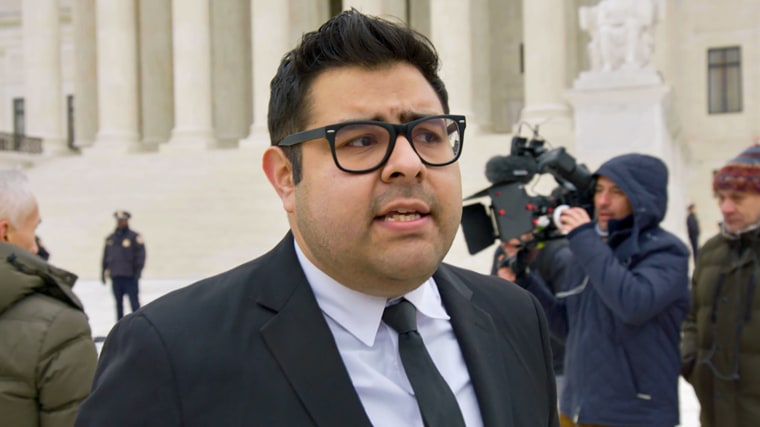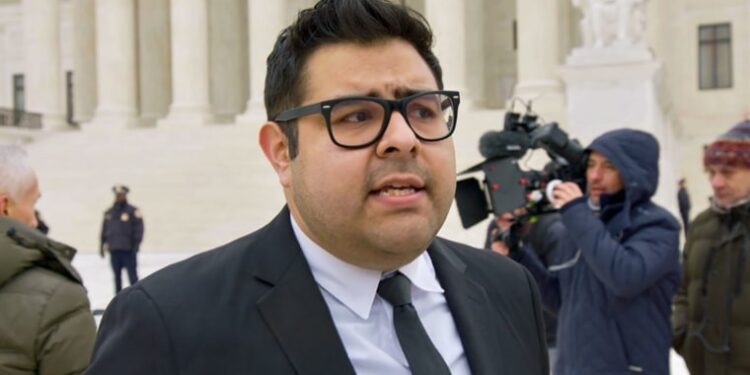Growing up in Northern California, Luis Cortes Romero was an enthusiastic learner and attended a school for gifted students. When his school organized a trip to Europe, Cortes Romero sold chocolates as part of the fundraising. Although he sold more chocolates than anyone in his class, he was disappointed when he found out he couldn’t go. He had no papers, his mother told him. This is how Cortes Romero learned that he was undocumented.
This week, a new documentary looks at Cortes Romero’s journey from disaffected young man to DACA grantee to the first undocumented lawyer to argue before the Supreme Court. “From Here/From There” (De Aquí /De Allá) premieres on PBS on July 9, kicking off the 2024 season of Voces.
DACA, short for Deferred Action for Childhood Arrivals, is a 2012 program started by President Barack Obama which allows young people brought to the U.S. as children who don’t have legal documentation to live and work without fear of deportation.
Born in Mexico, Cortes Romero was brought to the U.S. when he was 1 year old. As a young adult, he struggled with feeling “dichotomous” as he tried to balance his Mexican roots and his American life. “It felt hard to reconcile both,” he says in the film. “I wasn’t enough of one or the other, and neither of them.”
Thanks to his mother’s encouragement, Cortes Romero graduated college and went on to law school. “That’s when it dawned on me,” he said in an interview with NBC News, “that my lack of status was going to be a problem, that I maybe could never actually practice law.” Though he nearly quit, his mother insisted that he complete his studies.

A ‘game changer’ he later defends in court
When President Obama announced the DACA program, it was a “game changer” for Cortes Romero. In the film, he reflects, “It (DACA) took this weight off me that I didn’t realize how heavy it was, until it was off of me.”
Then came the Trump administration, which in 2017 moved to rescind DACA. After helping a DACA grantee who had been detained win his freedom, Cortes Romero became involved in a much larger struggle — the legal battle to save DACA.
Working with some of the nation’s top lawyers and legal scholars, Cortes Romero helped them find DACA recipients to serve as plaintiffs in the case.
“It was at first intimidating, to work with these famous lawyers,” Cortes Ramos said. “But I knew more about it (DACA) than they did. I knew every single part of the mechanics because I had gone through that process. I was able to explain it to them and contribute that way.”
In November 2019, Cortes Romero became the first undocumented lawyer to appear before the Supreme Court. The argument advanced by his team — that DACA should not be arbitrarily struck down because so many grantees, businesses and communities had come to rely on it — resonated with the court. This “reliance interest” was cited by Chief Justice John Roberts in his majority opinion in June 2020 keeping the program in place.
However, the high court did not rule on the merits of the program; they found that the Trump administration had improperly ended it and sent the case back down to the lower courts. The DACA program is currently under review by the Fifth Circuit Court of Appeals, which means its fate is uncertain.
“Because DACA has not been in the headlines lately, people don’t realize that it is still in danger,” Cortes Romero said.
“As an attorney, you are advocating and presenting your client’s story in the most effective way,” said Marlene Morris, the director of “From Here/From There” and a former immigration attorney. “The key through line is storytelling. As a filmmaker, I just carry that through … it’s all about social change and personal transformation.”
In making “From Here/From There,” Morris spent nearly five years, including during the pandemic, following the trajectory of DACA in real time.
Morris hopes that her film helps change some misconceptions that people have about the immigration system. “People are shocked that someone who has lived here for so long (like Cortes Romero) cannot apply for citizenship,” she noted. “Most people don’t understand the complexity and how antiquated our system is, and that is often doesn’t allow for legal pathways.”
While polls have generally shown public support for letting young people brought to the U.S. illegally as children adjust their immigration status, the future of DACA remains in doubt.
According to Muzaffar Chishti, senior fellow at the Migration Policy Institute, the Fifth Circuit will probably rule on DACA in the fall, or toward the end of 2024. “There is no official timeline for the case — but no matter how the ruling goes, neither side will give up and so the case will likely be appealed to the Supreme Court.”
Much has changed during the 12-year history of DACA. There are about 530,000 people in the U.S. currently enrolled in the program. In contrast, last year the Migration Policy Institute estimated 1.16 million immigrants would have qualified for DACA under 2012 rules if the program would have been allowed to continue accepting new applicants without legal attempts to stop it.
Since the issue of DACA was first brought to the Supreme Court, the high court’s composition has changed, Chishti pointed out, making it hard to predict how it will rule on the program. “I am generally optimistic on DACA, mostly based on the court’s (prior) acknowledgment of the “reliance interest” in letting it continue. But with respect to people who could have been eligible for it, but we not allowed to apply for it … we will probably need congressional action on this.”
Several states allow undocumented people to obtain a law license provided they meet the other requirements, such as passing the bar. Sergio Garcia of California became the country’s first undocumented attorney in 2014 after a California court ruled that he must be given a license to practice law.
Looking back on his pioneering case, Garcia remembered the pressure of being in the spotlight. “It was very draining, it was intense, I got threats to my life, and at my home and office. That was in addition to all the online trolling and abuse.”
Now Garcia is celebrating his 10th anniversary as a lawyer. He estimates that he has handled “in excess of 15,000” DACA applications and renewals. He has all types of clients, including victims of the devastating Camp Fire in Northern California in 2018, and many who are Trump supporters. “They come in here with their MAGA hats, and their T-shirts with slogans — and it doesn’t matter, because they know I am going to advocate for them.”
Garcia’s case led California to pass a law that allowed immigrants without legal status to apply for professional licenses in the state. It has since benefited everyone from nail technicians to contractors to lawyers like Cortes Romero.
After a 20-year wait, Garcia was able to obtain a green card through his father, a legal permanent resident. “But I don’t forget the fact that being undocumented in this country is a real nightmare. I don’t forget the fear you feel at times.” He urges his DACA clients to stay hopeful and believe that the future will contain opportunities.
Despite the uncertainty over the fate of DACA, Luis Cortes Romero is optimistic that Congress will “do the right thing.”
“When I think about the progress of social movements, especially within the immigrants’ rights community, I look to U.S. history,” he said. “The U.S. may have a long history of injustices, but it has a long tradition of people showing up when they need to show up.”
As he stated in “From Here/From There,” Cortes Romero added, “For us, home is always worth fighting for.”
For more from NBC Latino, sign up for our weekly newsletter.






